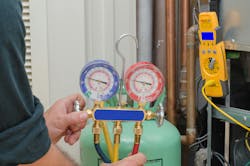AHRI Launches Initiative to Evaluate Low-GWP Refrigerants for Future HVAC Applications
ARLINGTON, Virginia — In response to production of new low-global warming potential (GWP) refrigerants that have not yet had the benefit of independent evaluation, the Air-Conditioning, Heating, and Refrigeration Institute (AHRI) is launching an industry-wide cooperative research program to identify and evaluate promising alternative refrigerants having a GWP of less than 300 for major product categories, such as air conditioners, heat pumps, chillers, and heat pump water heaters.
The program, called the Lower-GWP Alternative Refrigerants Evaluation Program, or Lower-GWP AREP, is of interest to AHRI members companies seeking to assess refrigerants that might be appropriate for future HVACR applications, while avoiding duplicative work. This is the third iteration of the program: AHRI successfully managed the original R-22 AREP in the 1990s and oversaw the work of AREP-2 in the 2010s in response to environmental concerns related to high-GWP refrigerants. As with previous efforts, AHRI will provide the leadership to coordinate and manage this industry-driven research and work closely with industry experts from its member companies.
“The objective of this program is to help the industry identify and evaluate the most promising refrigerants, as well as to understand the technical challenges of enabling their use,” said AHRI Vice President of Research Xudong Wang. “The program will not rank these alternatives, but will instead focus on identifying potential replacements for current refrigerants that will allow the industry to meet and comply with future regulatory activities in the United States and abroad.”
To begin, the Lower-GWP AREP will survey chemical producers to create a list of candidate refrigerants. Those that are selected will undergo comprehensive testing, including compressor calorimeter testing, system drop-in testing (if applicable), and soft-optimized system testing. Refrigerant stability and compatibility with lubricants and other common materials will also be tested, if necessary. Tests are expected to be performed at participating companies' laboratories, using their own resources, at their own expense.
The program will be overseen by a Technical Committee consisting of experts from AHRI member companies, operating under the AHRI Research and Technology Committee. The Technical Committee will be responsible for developing detailed test protocols prior to the start of the program, prioritizing tasks if refrigerant samples have limited availability, and ensuring the quality of the results to be published.
Once the Technical Committee roster is finalized, an open solicitation will be made to both U.S. and foreign manufacturers to participate in the testing program. Testing is expected to begin in January 2026.
